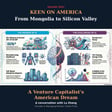
An American Epidemic of Speculation: Bubble Blowing in Silicon Valley and Washington DC
Bubble or not? But the debate that’s been raging over the current AI exuberance might be missing the bigger point. Yes, of course, it’s a trillion-dollar speculative bubble built around AI start-ups that mostly remain unprofitable. But as I note in my weekly tech conversation with That Was The Week publisher Keith Teare (who is significantly more optimistic than me), it’s more than just another Silicon Valley bubble. From the Trump family’s multi-trillion dollar cryptocurrency speculation to an increasingly pervasive online sports gambling culture (especially amongst young Americans), the new epidemic in America is one of speculation. A hundred years after the Roaring Twenties we are back where we started. I don’t know how it will end. Maybe there will be a 21st century version of Warren Harding’s Teapot Dome Scandal, maybe another Wall Street Crash. But I guarantee you two things: It will end, and that ending won’t be pretty - neither for America nor for the world. I’m even betting on it.
1. The Speculation Epidemic Goes Beyond AI This isn’t just about artificial intelligence. From Trump family cryptocurrency ventures to the explosion of online sports gambling among young Americans, speculation has become the defining characteristic of American economic culture. AI is merely the most visible manifestation of a broader shift toward betting on the future.
2. The State and Silicon Valley Have Merged Under the Trump administration, particularly with David Sacks as AI and crypto czar, government and tech investors have formed an unprecedented partnership—or as I suggest, a “marriage.” Regulatory barriers are being removed to facilitate rapid AI infrastructure development, marking a shift toward economic nationalism where the state’s fate is tied directly to tech industry success.
3. This Bubble is Different (But Still a Bubble) Unlike the dot-com boom or tulip mania, today’s AI investments are backed by massive actual revenues—NVIDIA generated $130.5 billion with 114% year-over-year growth. The money isn’t entirely self-generating; real revenue exists alongside speculative investment. Yet trillion-dollar valuations for unprofitable startups like OpenAI and Anthropic still raise legitimate bubble concerns.
4. Venture Capital Doesn’t Scale—And That’s Normal As venture capitalist Rulof Botha notes, VC isn’t really an asset class because only the top 10% of funds make money. Too much capital is chasing too few potential winners. This has always been true of venture capital, and most AI investments will fail. The question is whether AI will be like the internet (transformative) or interactive TV (a dud).
5. The Ending is Inevitable and Uncertain Keith and I agree corrections will happen, but disagree on the scale and meaning. Keith sees “systemic uplift” with temporary setbacks. I see potential catastrophe—perhaps a 21st-century Teapot Dome scandal or another Wall Street Crash. What’s certain: this speculative fever will end, and given historical precedent, that ending is unlikely to be gentle.
Keen On America is a reader-supported publication. To receive new posts and support my work, consider becoming a free or paid subscriber.
This is a public episode. If you'd like to discuss this with other subscribers or get access to bonus episodes, visit keenon.substack.com/subscribe










